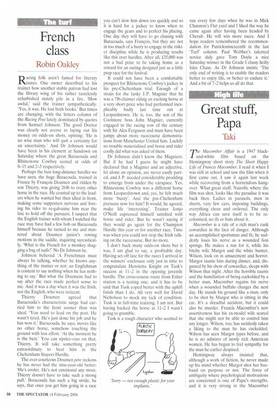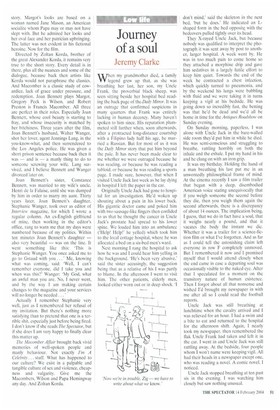Great stuff, Papa
Taki
The Macomber Affair is a 1947 black/ and-white film based on the Hemingway short story The Short Happy Life of Francis Macomber. I read it when I was still at school and saw the film when it first came out. I saw it again last week while recovering from a horrendous hangover. What great stuff. Nairobi, where the film was shot, looks like the paradise it was back then. Ladies in parasols, men in shorts, very few cars, imposing buildings, everything clean and ordered. The only way Africa can save itself is to be recolonised, no ifs or buts about it.
Macomber is a tale of a rich man's rank cowardice in the face of danger. Although an accomplished sportsman and fit, he suddenly loses his nerve as a wounded lion springs. He makes a run for it, while his bitchy wife Margot and the white hunter, Wilson, look on in amazement and horror. Margot taunts him during dinner, and, disgusted by his show of cowardice, sleeps with Wilson that night. After the horrible taunts and the humiliation of being cuckolded by a better man, Macomber regains his nerve when a wounded buffalo charges the next day. He stands his ground like a man, only to be shot by Margot who is sitting in the car. It's a dreadful accident, but it could also be murder. Francis Macomber's new assertiveness has his ex-model wife scared that she might not be able to control him any longer. Wilson, too, has suddenly taken a liking to the man he has cuckolded. Wilson has seen Margot types before, and he is no admirer of newly rich American women. He has begun to feel sympathy for the man he earlier despised.
Hemingway always insisted that, although a work of fiction, he never made up his mind whether Margot shot her husband on purpose or not. The force of ambiguity where psychological motivations are concerned is one of Papa's strengths, and it is very strong in the Macomber story. Margot's looks are based on a woman named Jane Mason, an American socialite whom Papa may or may not have slept with. But he admired her looks and her oval face and her patrician upbringing. The latter was not evident in his fictional heroine. Now for the film.
Directed by Zoltan Korda, brother of the great Alexander Korda, it remains very true to the short story. Every detail is in there, plus all the nuances and some of the dialogue, because back then artists like Korda would not paraphrase the classics. And Macomber is a classic study of cowardice, lack of grace under pressure, and redemption. Joan Bennett plays Margot, Gregory Peck is Wilson. and Robert Preston is Francis Macomber. All three are perfect in their roles. Especially Joan Bennett, whose cool beauty is starting to fray, and whose insecurity is matched by her bitchiness. Three years after the film, Joan Bennett's husband, Walter Wanger, shot her lover, agent Jennings Lang, in the you-know-what, and then surrendered to the Los Angeles police. He was given a short prison sentence because back then it was — and is — a manly thing to do to someone screwing your wife. Lang survived, and I believe Bennett and Wanger divorced later on.
Joan Bennett's sister, Constance Bennett, was married to my wife's uncle, Henri de la Falaise, until she was dumped by him in order to marry my aunt. Thirty years later, Joan Bennett's daughter, Stephanie Wanger, took over as editor of Interview magazine, for which I wrote a regular column. An ex-English girlfriend of mine, then working in the editor's office, rang to warn me that my days were numbered because of my politics. Within ten minutes Joan Bennett's daughter — also very beautiful — was on the line. It went something like this: 'This is Stephanie Wanger. You once asked me to go to Gstaad with you .. ' Me, knowing what was coming, said: 'Well, I can't remember everyone, did I take you and when was this?' Wanger: 'My God, what an awful man you are. No, I never went, and by the way I am making certain changes to the magazine and your services will no longer be needed...'
Actually I remember Stephanie very well, just as I remembered her refusal of my invitation. But there's nothing more satisfying than to pretend that one is a terrible shit, especially just before being fired. I don't know if she reads The Spectator, but if she does I am very happy to finally clear this matter up.
The Macomber Affair brought back vivid memories of well-spoken people and manly behaviour. Not exactly I'm A Celebrity. stuff. What has happened to our culture? We exist in a palpable and tangible culture of sex and violence, cheapness and vulgarity. Give me the Macombers, Wilson and Papa Hemingway any day, And Zoltan Korda.



































































 Previous page
Previous page